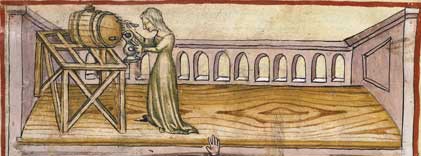cider vinegar 
Vinegar is used in many French recipes from the Middle Ages.
" Ex Aldebrandin's recipe: fill a container halfway with good wine and do not cover. This way you will obtain a good vinegar. If you want to go faster: heat steel or stones, plunge them into wine without covering. Or put the container in the sun for two or three days with salt. Or fill...
Vinegar is used in many French recipes from the Middle Ages.
" Ex Aldebrandin's recipe: fill a container halfway with good wine and do not cover. This way you will obtain a good vinegar. If you want to go faster: heat steel or stones, plunge them into wine without covering. Or put the container in the sun for two or three days with salt. Or fill a container with wine, cap it carefully and put it to boil in another container full of water. If you want to know whether vinegar is good or bad, here is a good procedure: sprinkle some on the ground or on a piece of iron. If the vinegar starts to boil, it is good. If it doesn't boil, it is bad.
-Use: As Rashmi Patni notes its transformation into an acidic element, the vinegar keeps some of the heat of the wine in it, so that one finds simultaneously in the vinegar opposite qualities hot and cold joined to the dryness. ». It is therefore a powerful remedy against obstructions; it counterbalances profitably the excess heat that can be found in certain meats and the excess moisture contained in fish. Its uses are varied. It is used to wash certain foods, such as snails, which must be rinsed in water until they no longer produce slime; then once in salt and vinegar and then put them to cook in water.
-Vinegar can give a sweet and sour taste to a preparation, the use of vinegar is used to embellish meat, venison of deer and wild boar, offal.
It is used to make "hot" sauces that accompany the "coldest" meats, it also season fatty fish and oysters. To attenuate the strength of the vinegar we add wine or beef broth.
Vinegar is also used to season salads. Described in feasts as early as the 15th century. The Tacuinum sanitatis advises to use vinegar to improve parsley, arugula, watercress or escarole and specifies that the consumption of olive oil must be balanced by vinegar.
Vinegar is used to preserve food, as shown by Master Martino in the middle of the 15th century, who advises, to keep fish, wine or vinegar healthy, the latter giving it a "better taste than simple salt water". The Tuscan cookbook by the poet Giosuè Carducci recommends that to preserve partridges or chickens, they should be boiled and then left for three days in vinegar before being placed in a container filled with wine and carefully sealed. More

Vinegar is used in many French recipes from the Middle Ages.
" Ex Aldebrandin's recipe: fill a container halfway with good wine and do not cover. This way you will obtain a good vinegar. If you want to go faster: heat steel or stones, plunge them into wine without covering. Or put the container in the sun for two or three days with salt. Or fill...

Vinegar is used in many French recipes from the Middle Ages.
" Ex Aldebrandin's recipe: fill a container halfway with good wine and do not cover. This way you will obtain a good vinegar. If you want to go faster: heat steel or stones, plunge them into wine without covering. Or put the container in the sun for two or three days with salt. Or fill a container with wine, cap it carefully and put it to boil in another container full of water. If you want to know whether vinegar is good or bad, here is a good procedure: sprinkle some on the ground or on a piece of iron. If the vinegar starts to boil, it is good. If it doesn't boil, it is bad.
-Use: As Rashmi Patni notes its transformation into an acidic element, the vinegar keeps some of the heat of the wine in it, so that one finds simultaneously in the vinegar opposite qualities hot and cold joined to the dryness. ». It is therefore a powerful remedy against obstructions; it counterbalances profitably the excess heat that can be found in certain meats and the excess moisture contained in fish. Its uses are varied. It is used to wash certain foods, such as snails, which must be rinsed in water until they no longer produce slime; then once in salt and vinegar and then put them to cook in water.
-Vinegar can give a sweet and sour taste to a preparation, the use of vinegar is used to embellish meat, venison of deer and wild boar, offal.
It is used to make "hot" sauces that accompany the "coldest" meats, it also season fatty fish and oysters. To attenuate the strength of the vinegar we add wine or beef broth.
Vinegar is also used to season salads. Described in feasts as early as the 15th century. The Tacuinum sanitatis advises to use vinegar to improve parsley, arugula, watercress or escarole and specifies that the consumption of olive oil must be balanced by vinegar.
Vinegar is used to preserve food, as shown by Master Martino in the middle of the 15th century, who advises, to keep fish, wine or vinegar healthy, the latter giving it a "better taste than simple salt water". The Tuscan cookbook by the poet Giosuè Carducci recommends that to preserve partridges or chickens, they should be boiled and then left for three days in vinegar before being placed in a container filled with wine and carefully sealed.
